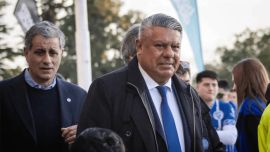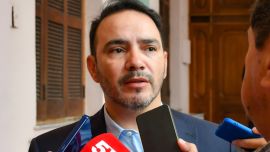Argentina has a huge debt. It needs to buy time. But how can you buy time with no money? Time is money. But in Argentina, time is debt.
The government’s biggest challenge is to buy time without defaulting on its humongous debt. President Alberto Fernández, heading a left-leaning Peronist coalition, is trying to solve the debt issue politically. He has met with the leaders of the big European nations. The republic also appears to have the support of Pope Francis, when it comes to finding some debt mercy. US President Donald Trump, on greeting the new Argentine ambassador last week, sent Fernández a friendly diplomatic salute of support. But will the private bondholders get the message? Will the hedge funds oblige and yield?
It doesn’t look like it. A bond swap offer by Economy Minister Martín Guzmán failed. Guzmán issued a statement in writing declaring that the bond will now be “reprofiled.” Maybe this is default playing out in slow motion. The message is that Argentina needs to grow first to pay later.
The minister addressed the Lower House of Congress on Wednesday. The government is also telling the world that it controls the domestic political front. Where are the centre-right opposition leaders demanding immediate payment of this debt? They are nowhere to be seen. Much of the debt, of course, was amassed by centre-right former president Maurico Macri during his 2015-2019 presidency. That debt included a loan of US$57 billion courtesy of the International Monetary Fund (IMF), of which US$44 billion was eventually doled out.
Guzmán’s speech to Congress tells Wall Street that the Argentine government is in control of the domestic arena and that there is no room for discussing austerity policies locally. The new economy minister is a mild-mannered US-trained debt expert who told lawmakers that immediate austerity policies are not an option. Growth, Guzmán said, is more important than any belt-tightening. Still, the minister is trying to meet an ambitious target of sorting out the debt issue by March 31. Guzmán is trying to explain himself in writing and in the grand stage of the Lower House. His aim is to avoid waffling press conferences in an effort to mark a difference with past neoliberal ministers who tripped over their words. He issued a statement when his bond swap failed dismally blasting the hedge funds who are not game to Argentina’s “good will.” World leaders have so far appreciated the Peronist administration’s manners. There is no inflammatory rhetoric about default (in contrast with the 2001 default announced in spectacular fashion in Congress by a Peronist president who survived a week in office). But will those manners convince the hedge funds?
Incidentally Vice-President Cristina Fernández de Kirchner, who is making few public statements, had something to say about the republic’s financial situation when she launched her book in Cuba last weekend. Fernández de Kirchner said the IMF should accept a reduction of Argentina’s debt even when technically it goes against its internal rules. (An IMF spokesman n Thursday said the Fund had not infringed any regulations by granting Marci the giant loan). Guzmán has not formally asked the IMF to accept a haircut to date. But possibly now Fernández de Kirchner is saying the things that the top officials involved in the direct negotiation would rather not say. There is growing speculation that Guzmán is on excellent terms with Fernández de Kirchner so possibly this is a “coordinated” move. The vice-president also underlined that most of the technocrats who approved lending money to Macri have now shuffled out of the IMF building in silence.
An IMF mission team arrived in Argentina this week. It has landed after Guzmán held constructive talks in Europe with Kristalina Giorgeva, the new IMF managing director. Donald Trump sent out a chummy word to Alberto Fernández too, but both leaders have yet to meet with the March 31 deadline looming. The president’s political approach means that it is the hedge funds who will have to push themselves into default if they don’t accept the terms of the March 31 deadline. He put the accent on the geopolitical dimension of the situation by meeting with the leaders of the European nations. If the big players in the IMF, especially the United States, get draconian with Argentina, then its political future could be unpredictable and potentially more radical. Guzmán was granted the parliamentary power to restructure the debt with the backing of the opposition.
Argentina stands united on the debt front. Yet the ruling Frente de Todos coalition still faces the challenge of avoiding rifts on other issues. The president was forced to declare that there are no “political prisoners” in Argentina after many Kirchnerite officials – including Buenos Aires Province Governor Axel Kicillof – said otherwise. Alberto Fernández said that there are “arbitrary detentions,” including that of the Jujuy province Kirchnerite activist Milagro Sala. Kirchnerite officials, in turn, have described Sala and other “political prisoners” as jailed, blaming Macri’s influence over the court system. Is this the first major rift in the government even when officials are calling it nothing more than a healthy bout of “internal debate”? Crime has also been the subject of internal arguments between Buenos Aires province and the federal government.



















Comments